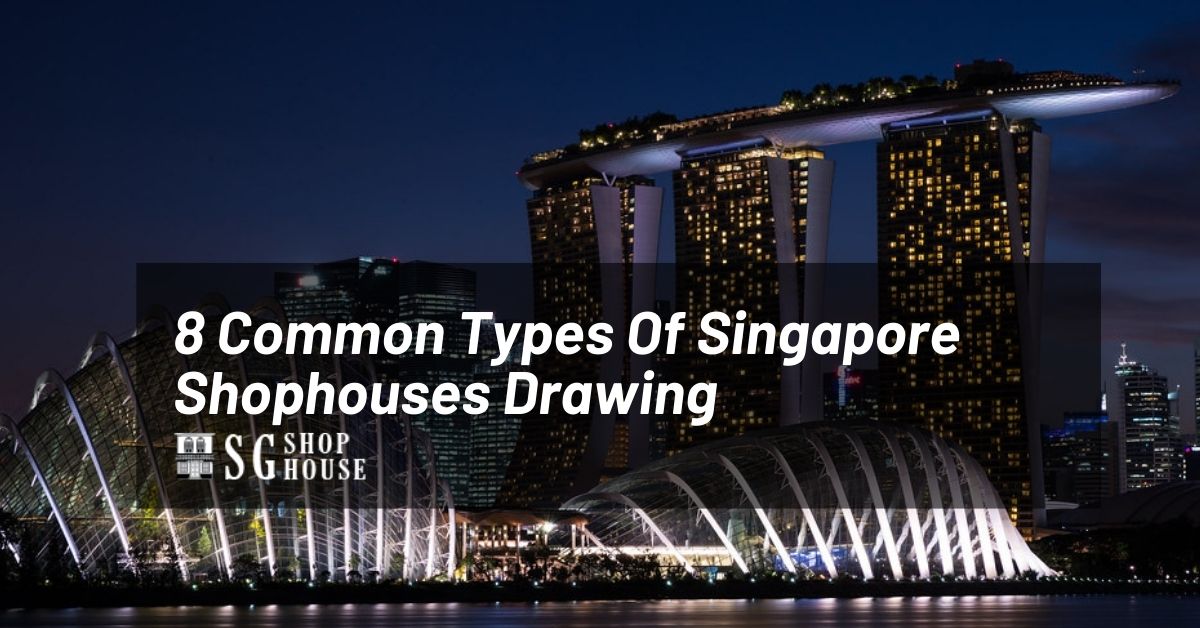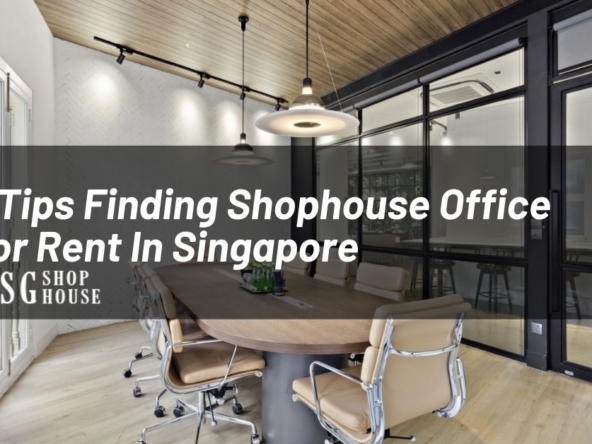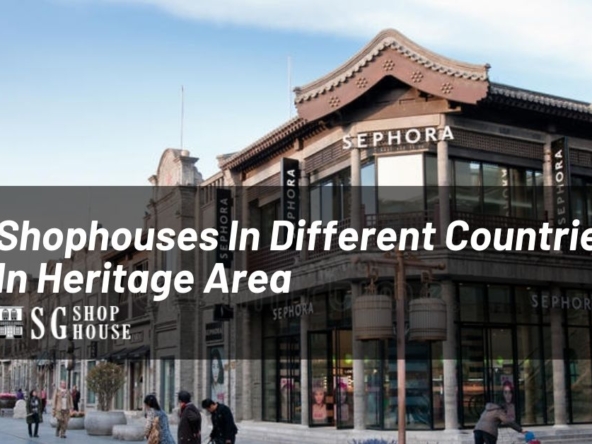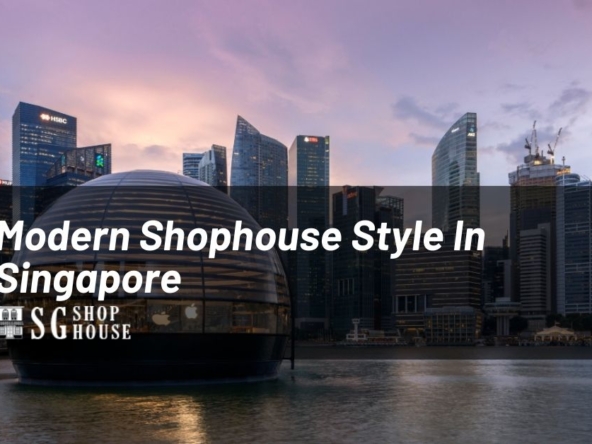Whether you’re a student of architecture or a casual admirer of interesting buildings, Singapore is an observational hothouse (to go along with its tropical climate). The city-state’s buildings represent an enchanting mix of Asian, British colonial, and modern global influences. “Singapore has its fair share of iconic buildings, especially (those built) in the ’90s and 2000s, that have contributed to a skyline that is distinctive from other Asian cities,” said Chong Keng Hua, associate professor of architecture and sustainable design at the Singapore University of Technology and Design. “The juxtaposition of futuristic, high-rise green buildings with post-independence (after 1965) modern complexes and older colonial buildings and shophouses give Singapore’s urban landscape a unique identity and experience,” he added. Here are 8 common types of Singapore shophouses drawing, representing its past, present, and future.
1.Singapore Shophouses Drawing: Victoria Theatre and Concert Hall
Opened: 1862 (theater building) and 1905 (concert hall building)
Architect: John Bennett (theater building) and Regent Alfred John Bidwell of Swan & Maclaren (concert hall building)
Current use: Theater and concert hall
Set in the Civic District, the neoclassical Victoria Theatre (614 seats) and Concert Hall (673 seats) are among the most illustrious venues in Singapore, and the building is notable for its iconic clock tower. The theater started out as the Town Hall and was one of the first buildings of Singapore’s Victorian Revivalism era. The concert hall, meanwhile, began life as the Victoria Memorial Hall in 1905, named after the British monarch who had died less than five years prior. Back in 2010, this national monument was closed for a four-year, $158 million Singapore ($116 million) makeover to restore its neoclassical facade and to install state-of-the-art facilities, according to the theater. It reopened with a big splash in 2014.
Address: 9 Empress Pl, Singapore 179556
2.Fullerton Hotel Singapore

Architect: Major Percy Hubert Keys and Frank Dowdeswell
Use: Hotel
3.Singapore Shophouses Drawing: CHIJMES
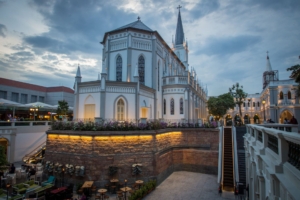
Opened: 1840-41
Architect: George Drumgoole Coleman
Use: Dining and nightlife venue
As is the case with many older structures, the purpose of CHIJMES — which pronounced “chimes” — has evolved over time. The oldest building in the complex is Caldwell House, which later became a Catholic convent for girls (the name CHIJMES relates to its name, Convent of the Holy Infant Jesus Middle Education School). It is now a peaceful oasis by day and a bustling entertainment center at night. But the standout structure is the complex’s Gothic chapel, which features a five-story spire and flying buttresses. The structure’s 648 columns feature carvings of tropical plants and birds, while inside, a dazzling white chapel can be reserved for weddings. Along with other entries on this list, you may have seen this building in the 2018 movie “Crazy Rich Asians.”
Address: 30 Victoria St, Singapore 187996
4.National Gallery Singapore
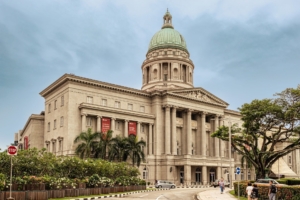
Opened: 2015
Architect: StudioMilou and CPG Consultants
Use: Art museum
The National Gallery Singapore is an art museum located in the Downtown Core district of Singapore. Opened on 24 November 2015, it oversees the world’s largest public collection of Singaporean and Southeast Asian art, consisting of over 8,000 artworks. The National Gallery is a microcosm of what the city-state does best — blend the old with the new. In this case, the City Hall and Supreme Court buildings have been transformed into Singapore‘s premier art museum. The neo-classical City Hall first opened its doors in 1929, and the Supreme Court building came along a decade later. Significant parts of the structures preserved — including the chamber where the Japanese surrendered to the British at the end of World War II — so visitors can take in their historical significance as they explore an impressive collection of Southeast Asian art. Chong said, “the result is simple yet elegant.”
Address: 1 St Andrew’s Rd, Singapore 178957
5.Singapore Shophouses Drawing: Marina Bay Sands
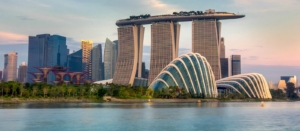
Opened: 2010
Architect: Moshe Safdie
Use: Hotel, casino and mall
Marina Bay Sands is another notable Singapore project from architect Moshe Safdie. The hotel has become a signature part of the city’s skyline, immediately identified by its three towers and cantilevered sky garden, which hosts the world’s largest rooftop infinity pool (check out the video above to see what it’s like to swim there). “To me, this is more of an urban project than an architectural project, as it has transformed both the waterfront and downtown skyline,” Chong said.
Address: 10 Bayfront Ave, Singapore 018956
6.Esplanade — Theatres on the Bay
Opened: 2002
Architect: DP Architects and Michael Wilford & Partners
Use: Entertainment complex
Esplanade – Theatres on the Bay is a performing arts centre located in Downtown Core near the mouth of the Singapore River. Named after the nearby Esplanade Park, it consists of a concert hall that seats about 1,600 and a theatre with a capacity of about 2,000 for the performing arts. You might know Esplanade by its informal name: “The Durian.” That’s because the theater’s twin glass domes — made from more than 7,000 triangular aluminum sunshades — bear a striking resemblance to two halves of a durian, a strong-smelling fruit popular in the region.
Chong says the building’s signature spiky facade wasn’t part of the original design. “It was initially conceiving as two glass shells without shading, which drew much criticism for its insensitivity to the tropical climate, as it would create a greenhouse effect.” Thus, the iconic shades. The building may be famous, but that doesn’t mean the design is universally loved. Since opening in 2002, Esplanade has been given various other nicknames, some not so flattering. Beloved or berated, however, it’s an undeniable part of Singapore‘s urban identity.
Address: 1 Esplanade Dr, Singapore 038981
7.Singapore Shophouses Drawing: Raffles Hotel
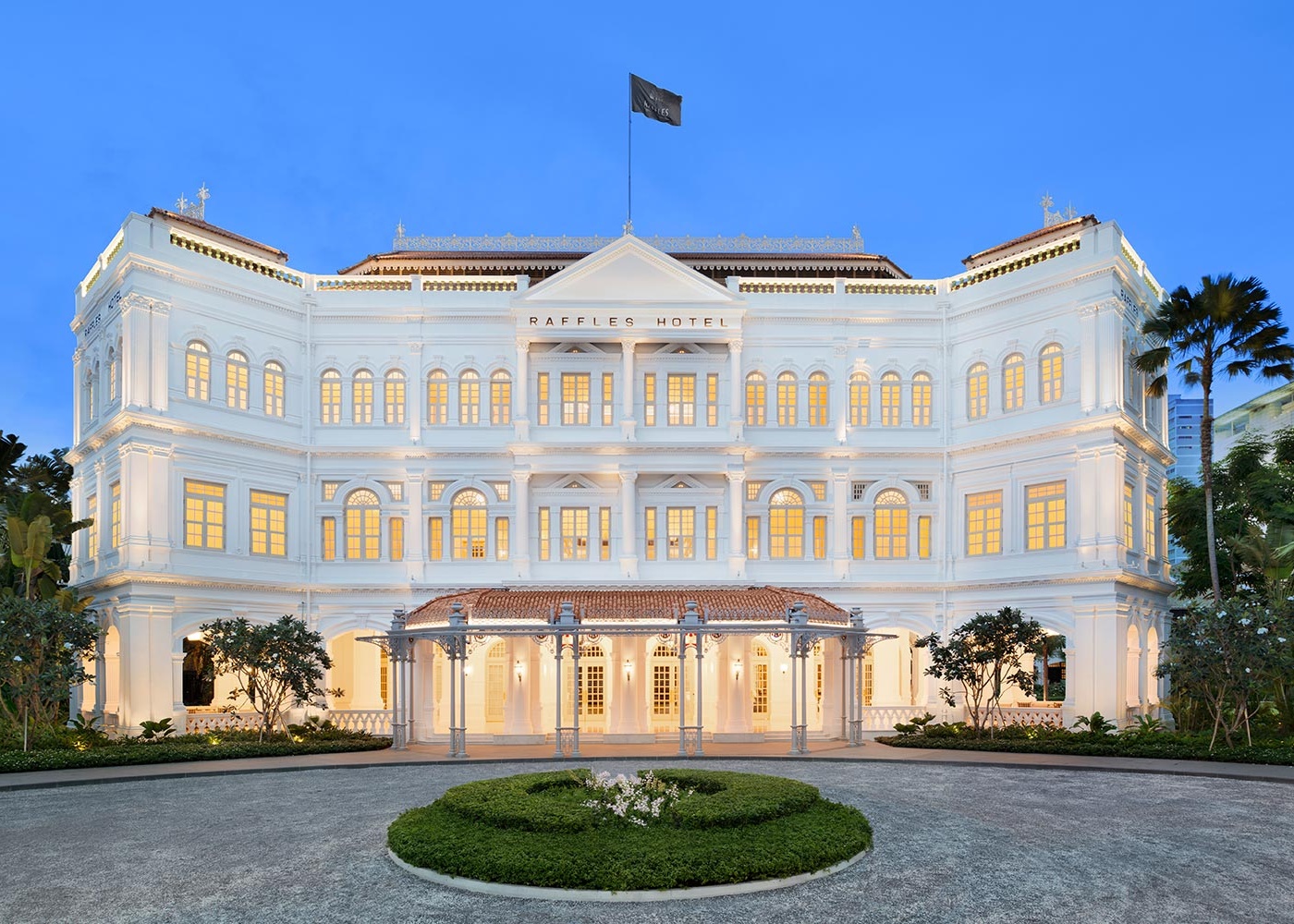
Opened: Opened in 1887 (as a 10-room bungalow)
Architect: Regent Alfred John Bidwell of Swan & Maclaren (main building, 1899)
Use: Hotel
The grande dame of famous Singapore buildings has somewhat modest beginnings. In the late 1880s, the Armenian Sarkies brothers leased a bungalow owned by an Arab trader. They named it after British colonizer Sir Thomas Stamford Raffles and started out with just 10 rooms for their guests. It didn’t stay modest for long. From the opening a new three-story main building in 1899 to a huge overhaul in 2019 (and numerous makeovers in between), Raffles Hotel has become the signature example of colonial architecture in Singapore. Its white exterior and neo-Renaissance design includes tropical necessities such as high ceilings and extensive verandas. “Raffles Hotel is well-known for its history and luxurious ambiance,” Chong said.
Fun fact: This is also where the famous cocktail Singapore Sling invented.
Address: 1 Beach Rd, Singapore 189673
8.Jewel at Changi Airport
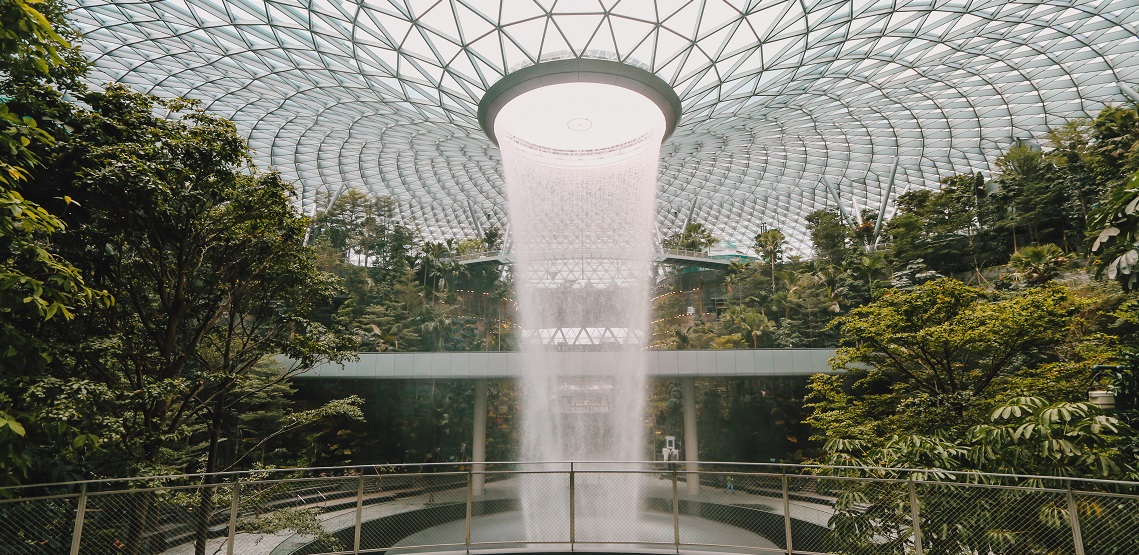
Opened: 2019
Architect: Moshe Safdie
Use: Entertainment and retail complex
We go from an old-school colonial classic to the newest building on the list: Jewel at Changi Airport. Jewel Changi Airport is a nature-themed entertainment and retail complex on the landside of Changi Airport, Singapore, linked to three of its passenger terminals. From the fertile mind of architect Moshe Safdie, the building is impressive both inside and out. The exterior takes the form of a dramatic doughnut shape framed in glass and steel. The interior, meanwhile, nods to nature with a hedge maze, glass-bottomed canopy bridge, and the world’s tallest indoor waterfall, known as the Rain Vortex.
Also found inside the 10-story building (five below ground, five above) are entertainment venues, shops, restaurants, a hotel, and services for airline passengers, such as early check-in, baggage storage and connections to three of the airport’s terminals. “Jewel has redefined airport, retail and public space all at once,” Chong said. “It creates a huge impact in making Changi Airport the most recognizable — and probably the most Instagrammable — airport in the world.”
Address: 78 Airport Blvd, Singapore 819666


